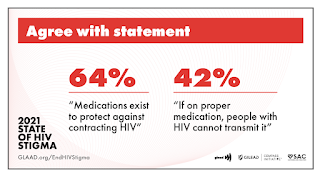By: Brandon M. Macsata, CEO, ADAP Advocacy Association
In 2020, with the introduction of the coronavirus disease 2019 (COVID-19) into our daily lives, it was often said that 2021 would have to be better! It just had to be better, right? Well, life has a tendency of throwing curveballs and this year has been no exception. Arguably 2021 hasn't been much better than last year and in many ways it has been even worse (i.e., 386,233 people have died due to the virus, compared with last year's toll of 385,343).[1] That said, there remains much for which to be thankful...and it seems timely and appropriate to acknowledge them. Today is about giving thanks.
First and foremost, Bill Arnold. This Lion of the modern-day HIV/AIDS advocacy changed my life for the better, literally. Sure, losing him to the Heavens earlier this year has been painful but it also open to door to reflection. Rarely does the world introduce us to a kinder, more gentle, sincere and interesting fella. Bill's time honored stories were as much a staple to him as his notoriously famous fly fishing vest. I miss both. Bill was my colleague, my board co-chair, my client, my mentor...and most of all, my friend. But, I'm giving thanks for having known him!
 |
| Bill Arnold, 1938-2021 |
I'm also giving thanks to Phil, Elmer, Wanda, Jen, Eric, Lyne, Hilary, Lisa, Glen, Jennifer, Theresa, and Guy. As my board of directors, they embody a commitment to excellence. Without their leadership, support and vision the ADAP Advocacy Association wouldn't be the respected organization it is today. This collective group of folks have found a way to govern our group under unanimous consent, which speaks volumes to their character as individuals.
It is hard to imagine our efforts to promote and enhance the AIDS Drug Assistance Programs (ADAPs) would even be possible without our advocacy partners. We complement each other's work each and every day, and for that I'm giving thanks. Among them, Brian Hujdich and everyone at HealthHIV, and Bruce Richman and everyone at the Prevention Access Campaign ("Undetectable = Untransmittable" U=U campaign), and Shabbir Imber Safdar and everyone at the Partnership for Safe Medicines, and of course, Jeffrey R. Lewis and everyone at the Legacy Health Endowment.
Our funders! It is also hard to imagine where we'd be without their ongoing support, financially and otherwise. Our organization has demonstrated that meaningful partnerships do exist between patient advocacy and the pharmaceutical industry. The dogmatic claims that industry funding is paramount to a bride are not only unfounded, they're also unhelpful to our collective efforts to improve access to care and treatment. Giving thanks to our industry, and non-industry funders, including AbbVie, AIDS Alabama, Avita Pharmacy, Community Access National Network, Gilead Sciences, Janssen Pharmaceutical Companies of Johnson & Johnson, Magellan Rx Management, Maxor National Pharmacy Services Company, MedData Services, Merck, Napo Pharmaceuticals, North Carolina AIDS Action Network, Partnership for Safe Medicines, Patient Access Network Foundation, Patient Advocate Foundation, PayPal Giving Fund, Pharmaceutical Research and Manufacturers of America, Ramsell Corporation, ScriptGuideRx, Theratechnologies, ViiV Healthcare, and Walgreens. Giving thanks to our small donors, too. You could donate to so many other charities, yet you choose to support us!
#YourVaccineIsWaiting. With the ongoing Covid-19 pandemic showing no sign of slowing down, we're giving thanks to the life-saving Pfizer-Biontech, Moderna, and Johnson & Johnson vaccinations, and to all of the people who made it possible. And to that end, additionally we're giving thanks to Josh Robbins, Tez Anderson, Jen Laws, Michelle Anderson, and Jonathan J. Pena, MSW for making possible our educational public service announcements! "Ya'll" (enter Josh's voice) did a great service to our community.
As this pandemic has stretched to the limits the first responders and front-line healthcare workers we all too often take for granted, it must be said, THEY are the reason we are surviving the coronavirus. Giving thanks to all the pharmacists, physicians, surgeons, nurses, physician assistants, medical assistants, nursing aids, respiratory therapists, anesthesiologists, phlebotomist, behavioral health professionals, social workers, police officers, firemen (and women), and emergency medical technicians.
And most of all, I'm giving thanks to my three-year son, Sebastian. I'm proud to be your Pa Pa! Your presence in my life makes it a litter easier to cope with the craziness that surrounds us.
[1] Musto, Julia (2021, November 23). US COVID-19 deaths in 2021 surpass 2020's toll. MSN News. Retrieved online at https://www.msn.com/en-us/news/us/us-covid-19-deaths-in-2021-surpass-2020s-toll/ar-AAR33qm?ocid=uxbndlbing
Disclaimer: Guest blogs do not necessarily reflect the views of the ADAP Advocacy Association, but rather they provide a neutral platform whereby the author serves to promote open, honest discussion about public health-related issues and updates.





